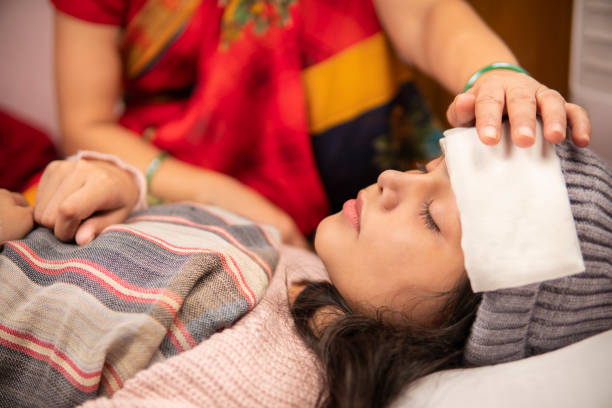
Indoor image of Indian matures mother sponging her ill daughter’s forehead to reduce the temperature down. She is having a high fever and lying in bed at home. She is wearing warm clothes.
What is Typhoid Fever?
Table of Contents

Typhoid fever is a bacterial infection caused by Salmonella typhi. It spreads through contaminated food or water and can lead to serious health complications if untreated. It is particularly prevalent in areas with poor sanitation.
Types of Typhoid Fever
- Acute Typhoid Fiver: The most common form, characterized by fever, abdominal pain, and gastrointestinal issues.
- Chronic Typhod Fever: A less common but persistent form where the bacteria remain in the body after symptoms subside, making the person a carrier.
- Relapsing Typhoid Fev: In some cases, symptoms may recur weeks after recovery from the initial infection.
Main Causes of Typhoid Fever
Typhoid fever is primarily caused by the Salmonella typhi bacteria. The bacteria enter the body through ingestion of contaminated water or food. Other causes include:
- Poor sanitation
- Contaminated drinking water
- Consuming food prepared by infected individuals
- Close contact with someone carrying the bacteria
Signs and Symptoms of Typhoid Fever
The signs and symptoms of fever can range from mild to severe and typically develop 1 to 3 weeks after exposure. They include:
- High fever (up to 104°F or 40°C)
- Abdominal pain
- Headache
- Weakness and fatigue
- Diarrhea or constipation
- Loss of appetite
- Rashes (rose-colored spots)
- Enlarged spleen and liver
Risk Factors
Risk factors
- Traveling to areas with poor sanitation and endemic fever (South Asia, Africa, etc.)
- Consuming contaminated food or water
- Close contact with someone infected with typhoid
- Working in laboratories handling Salmonella bacteria
How to Prevent Typhoid Fever
- Vaccination: The typhoid vaccine is available and effective for travelers and people at high risk.
- Sanitation: Practice good hygiene, like handwashing with soap and clean water.
- Water Safety: Drink bottled or boiled water and avoid ice.
- Food Safety: Avoid raw fruits and vegetables unless peeled, and eat fully cooked food.
- Travel Caution: Be extra cautious when traveling to typhoid-endemic areas.
How is Diagnosed?
Diagnosis of typhoid fever typically involves:
- Blood Tests: A blood culture to detect the presence of Salmonella typhi.
- Stool/Urine Culture: To identify the bacteria.
- Widal Test: An older, less reliable test that checks for specific antibodies.
How to Treat
- Antibiotics: Commonly used antibiotics include Ciprofloxacin and Azithromycin to eliminate the bacteria.
- Hydration: It’s essential to maintain hydration, especially if experiencing diarrhea.
- Rest: Adequate rest helps in the recovery process.
- Diet: Light, easily digestible meals that are high in nutrition.
Home Remedies for Typhoid Fever
While infectious fever requires antibiotics, certain home remedies can help alleviate symptoms:
- Hydration: Drink plenty of fluids, such as ORS (Oral Rehydration Solution) to prevent dehydration.
- Cold Compress: Applying a cold compress can help in reducing fever.
- Basil Leaves: Known for their antibacterial properties, basil leaves boiled in water can be consumed.
- Apple Cider Vinegar: Helps reduce fever by drawing out heat.
- Garlic: Known for boosting the immune system, garlic can help speed recovery.
Ayurvedic Medicine to Cure Typhoid Fever
In Ayurveda, infectious fever can be managed by balancing the body’s doshas and using herbs that possess antibacterial and immune-boosting properties. Some Ayurvedic remedies include:
- Guduchi (Tinospora cordifolia): Strengthens the immune system and helps fight infections.
- Ashwagandha: Helps reduce fever and inflammation.
- Neem: Known for its antibacterial properties, neem can help combat bacterial infections.
- Triphala: A combination of three fruits, it helps improve digestion and overall immunity.
- Pippali (Long pepper): Helps enhance the body’s resistance to bacterial infections.
Precautions, Self-Care Tips, Conclusion, Disclaimer
Precautions:
- Ensure proper sanitation and hygiene in daily life.
- Vaccinate before traveling to high-risk areas.
- Avoid street food and drink only purified water.
Self-Care Tips:
- Get plenty of rest during recovery.
- Follow a nutritious diet, avoiding spicy or oily food.
- Maintain hydration through water, broths, and herbal teas.
Conclusion:
Typhoid fever is a serious illness, but it is preventable and treatable with the right measures. Vaccination, proper sanitation, and early diagnosis are crucial in preventing its spread. If you suspect infectious fever, consult a healthcare professional immediately.
Disclaimer:
The information provided in this article is for educational purposes only. Always consult your doctor or healthcare provider for medical advice and treatment specific to your condition.
Additional Tips:
- Always peel fruits and vegetables when traveling to high-risk areas.
- Regularly disinfect surfaces and objects that are frequently touched.
- Avoid raw shellfish, especially in areas with poor water sanitation.






